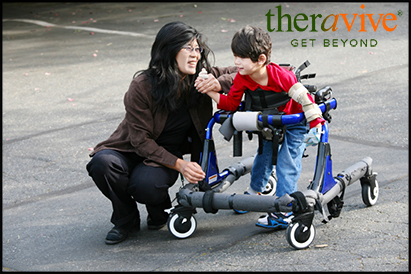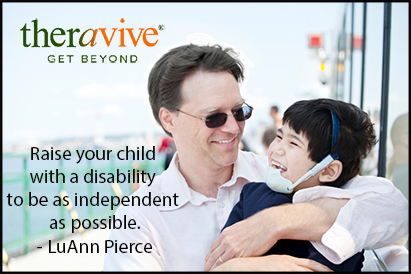 New parents often anticipate each new development in their babies with excitement and anticipation. As babies reach new milestones, parents and siblings applaud and cheer, eager for the next celebration. The normal ages and stages in child development allow for some wiggle-room, usually a range of a few weeks to a few of months for different tasks. When babies do not reach developmental milestones within the given range, it could mean the child has a problem.
New parents often anticipate each new development in their babies with excitement and anticipation. As babies reach new milestones, parents and siblings applaud and cheer, eager for the next celebration. The normal ages and stages in child development allow for some wiggle-room, usually a range of a few weeks to a few of months for different tasks. When babies do not reach developmental milestones within the given range, it could mean the child has a problem.
At that point, medical providers usually begin to pay more attention to the child’s development, looking for any signs of delays. At some point, babies who are not developing within normal limits will likely be examined for developmental delays. Developmental delays may be related to cognitive development, speech, hearing, vision, walking or movement and self care.
What The Numbers Tell Us
The prevalence of children born with a developmental disability has increased over 17%, according to the most recent reports from the Center for Disease Control ((CDC). The US Census Bureau also studied school age children in 2010 to determine what types of schools children attended. They found that among 5-17 year olds in the US, about 5% of children living in metro areas and 6.3% of children living in non-metro areas reported having a disability. Less than 1% of those children reported hearing, vision or speech impairment. About 1% reported ambulatory or self care impairment. About 4% reported cognitive impairment.
Cerebral Palsy (CP) is one of many disorders that can affect babies. About 2-3 out of 1,000 babies are born with CP. According to the March of Dimes, babies with CP have delays in rolling over, walking, sitting, standing or crawling. CP is a group of conditions that affects movement, posture and balance. There are three types of CP. If a child has delays in any of the areas mentioned, talk to your medical provider.
 Effects of Childhood Disability on Families
Effects of Childhood Disability on Families
Families often experience chronic stress when a child is diagnosed with a disability of any kind. Medical appointments, frequent and often costly procedures and treatments, time away from work and basic uncertainty are among a few of the stressors. Parents with other children also have to help the siblings understand and cope with the news.
Feelings of loss and grief are common. Parents report their dreams and ambitions for their child and family are lost when they learn about the disability. Many parents experience guilt, fearing they could have prevented the condition somehow. Siblings may experience survivor guilt, wondering why they are healthy and the new sibling is not. Family and/or individual therapy can be very helpful during this time. Many hospitals and organizations offer support groups that are also quite comforting.
The divorce rate among couples who have a child with a disability is higher than that of other couples. It is more important than ever to make ways to take care of yourself and your relationship.
It is also important to teach your other children to help out around the house and in the family. However, you must take care not to burden your other children. Often siblings feel they have to take on too much responsibility. Children and teens need to have as normal a life as possible, being involved in school events and programs and enjoying their friends while still helping with age-appropriate chores, etc.
If your other children begin to have problems in school – slipping grades, behavioral problems, cutting class, fighting, etc. – seek counseling for the whole family. In these cases, the child often acts out to bring attention to problems they are unable to express verbally.
Ways to Reduce the Risks
1. Maintain open communication about the disorder, the prognosis, etc. However, take care to only share what is age-appropriate with children. Ask your medical provider for guidance about what and how to talk to other children about the disability.
2. Find a support network. Ask for referrals to specialists, support groups and other providers. Do your research – help is available. Support your spouse/partner and lean on each other, without over-burdening one another.
3. Ask for help when needed. Recruit family members, friends and neighbors to help with things like transporting kids to activities/car-pooling, shopping and other errands and trips. Line up sitters who are trained to provide care to a child with special needs. Keep up with your hobbies and date night to protect your well being and your relationships.
4. Raise your child with a disability to be as independent as possible. Begin at an early age to foster independence and encourage your child to be all s/he can be within his/her limitations. This can make a huge difference as the child gets older in terms of his/her skills and abilities, and attitude toward trying new things and taking risks.
5. Use the circumstances to promote resilience. Raising a child with a disability can make you, your relationship with your spouse/partner and your family stronger if you approach it the right way. If it doesn’t come naturally to you, find a counselor, minister or friend to help you reframe this situation from a tragedy into an opportunity. Begin to look for the hidden opportunities for growth, for you, your family, children and relationship. Teach all of your children to do this – it will change your mindsets from one of victimization to one of empowerment and growth.
_________________________________________________________________________________________________________________________________
"Cerebral Palsy." March of Dimes. Web. 19 Mar. 2014.
"Developmental Disabilities Increasing in US." Centers for Disease Control and Prevention. Centers for Disease Control and Prevention, July-Aug. 2011. Web. 19 Mar. 2014.
US Census Bureau, 2010 American Community Survey.
About the Author
 LuAnn Pierce, LCSW
LuAnn Pierce, LCSWI am a clinical social worker, therapist and writer. Currently, I offer online therapy and coaching services to people in Colorado and Wyoming. As a provider for the CO Department of Vocational Rehabilitation and the National MS Society, my expertise in counseling people who have disabilities and chronic illness is considerable. I have written for About.com, DailyRx.com, Theravive.com, GoodTherapy.org, SelfHelpMagazine.com and contribute to several other online health and mental health sites.
Office Location:
19th & Dahlia
Denver, Colorado
80220
United States
Phone: 303-910-2425
Contact LuAnn Pierce, LCSW
Professional Website:
http://HireASocialWorker.com